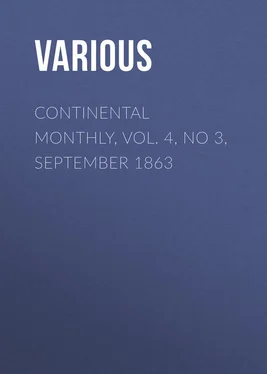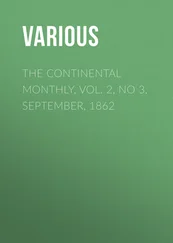Various - Continental Monthly, Vol. 4, No 3, September 1863
Здесь есть возможность читать онлайн «Various - Continental Monthly, Vol. 4, No 3, September 1863» — ознакомительный отрывок электронной книги совершенно бесплатно, а после прочтения отрывка купить полную версию. В некоторых случаях можно слушать аудио, скачать через торрент в формате fb2 и присутствует краткое содержание. Жанр: periodic, Языкознание, periodic, foreign_edu, на английском языке. Описание произведения, (предисловие) а так же отзывы посетителей доступны на портале библиотеки ЛибКат.
- Название:Continental Monthly, Vol. 4, No 3, September 1863
- Автор:
- Жанр:
- Год:неизвестен
- ISBN:нет данных
- Рейтинг книги:3 / 5. Голосов: 1
-
Избранное:Добавить в избранное
- Отзывы:
-
Ваша оценка:
- 60
- 1
- 2
- 3
- 4
- 5
Continental Monthly, Vol. 4, No 3, September 1863: краткое содержание, описание и аннотация
Предлагаем к чтению аннотацию, описание, краткое содержание или предисловие (зависит от того, что написал сам автор книги «Continental Monthly, Vol. 4, No 3, September 1863»). Если вы не нашли необходимую информацию о книге — напишите в комментариях, мы постараемся отыскать её.
Continental Monthly, Vol. 4, No 3, September 1863 — читать онлайн ознакомительный отрывок
Ниже представлен текст книги, разбитый по страницам. Система сохранения места последней прочитанной страницы, позволяет с удобством читать онлайн бесплатно книгу «Continental Monthly, Vol. 4, No 3, September 1863», без необходимости каждый раз заново искать на чём Вы остановились. Поставьте закладку, и сможете в любой момент перейти на страницу, на которой закончили чтение.
Интервал:
Закладка:
That men and women, taught from infancy to look upon slavery as a moral and political as well as a material good; whose ideas, manners, habits have become interwoven with its existence in their midst, and who, no matter how falsely, as those may think who look upon it from a comparatively disinterested standpoint, conceive that it lies at the base of their social prosperity and happiness; who have been accustomed from forum, hustings, pulpit, and press, to hear an institution that appeals to so many selfish instincts and principles in the human heart, lauded and defended, and made to be the Ultima Thule of Southern hope, pride, and ambition; that they should view with displeasure and anger such an influence as the institutions of New England must always wield, is not so surprising. But that men can be found here in the free North, yea, more, in New England itself, to sympathize with them, to echo their degraded sentiments, and to wish to see the slave power supreme in the land, is what surpasses wonder, and almost belief. Yet a portion of a large, old, and venerated party have come to be their miserable allies and claqueurs. The truth is, we may say and believe that slavery is a dire wrong, a foul injustice, done to a whole race, and therefore ought to die, but that does not tell one half of the damning story: the worst is this, that it gradually kills out the virtue, the manliness, the moral vitality of the nation that allows it; that it has done so in our own nation to an alarming extent is the great, the fear-impelling cause why it should be rooted out, abolished, as an influence in the Government.
'Ah, but,' says the Northern traitor, 'that very abolition has done the whole mischief. If there had been no Abolitionists, there would have been no war. The Abolitionists are responsible for it all.' Softly, poor, weak-minded man! Does not any man's common sense tell him that wherever a wrong exists, it is in the nature of things that somebody should oppose it – that a desire should arise to get rid of it? It is the chief mercy of God to the world, next to His providing salvation for it, that this conscience is left to it, this sense of wrong, and the will and struggle to abolish the wrong. For such remonstrance the Abolitionists are indeed responsible!
There are certain words that have come to be used in an indefinite, canting sort of way, so that they have no meaning at all, or, at least, a meaning very deceptive. These words represent bugbears to unthinking people, and unscrupulous men do not fail to pervert this fact to their own or party ends. Such are some of the terms which have been applied to New England, both South and North. She is called radical , and a most absurd and mischievous idea of New England radicalism is rife, especially in the South. Said a Southern gentleman to me on one occasion (he was a physician, was one of the most intelligent slaveholders I ever met, and was an occasional contributor to De Bow's Review ):
'You New Englanders do not believe anything; you are all freethinkers – is it not so?'
Par parenthese , that word freethinker is another of the terms conventionally abused. This gentleman had just been speaking of this very thing, New England radicalism, and in his query showed an evident idea that it involved that species of unbelief, that discarding of all creeds or standards of belief, popularly known as freethinking . It also includes, in the minds of many of the Southern people, the exercise of a kind of personal license, an abandoning of the good old established landmarks of thought and action, and a strong-minded striking out into new paths of experiment, regardless of form or law. A Northern woman going to the South is assumed to be strong-minded , especially, till she has proved herself feminine . There is nothing so absurd as this idea, when one considers that there is no people on earth as free, independent, and original, intellectually, as they are, who possess so deep and abiding a respect and veneration for those same laws and institutions. New England is the prolific hive whence swarm all the isms that infest the country, say they. They do not understand that in a state of society where education is universal, where mind is constantly meeting mind, and thought clashing with thought, the restless and heaving mass must be always throwing up something to the surface, it may be froth, it may be tangled weeds, rough stones, or plain shells, or it may be curious and valuable gems fit to glitter in a coronet, or shells of dazzling colors and manifold convolutions fit to shine in rare cabinets. The waveless and stagnant calm of the mass of the Southern mind can have no conception of the intellectual movement that is ever going on in such a community as New England.
But this radicalism especially bears on its 'horrid front' that bugbear of all conservatism, the world over — abolition . There is no word so abused as that. The thing itself is as old and inevitable as the relation of cause and effect, as the existence of sin and righteousness, as the contest between God and Satan. Just as if there could help being an abolition sentiment where there existed the aggressive, hateful principle of slavery!
Then that peculiar and valuable trait of Yankee character, which the French so aptly call savoir faire , and which they themselves term faculty , the power of accomplishing, the knowing how to do, the understanding how to suit means to ends, which makes a Yankee so useful and versatile, and consequently a valuable acquisition to society – has received its full share of Southern abuse and ridicule. 'They palm off upon us their inventions, half of which are worthless,' say they. 'They cheat us with their wares, their manufactures, their patents, and nostrums. They grow rich on our necessities, and take the world's trade from our harbors, so superior to theirs, and they are always busy, and intermeddling in everybody's affairs; and we hate them – ah, how we do hate them!' In short, a certain leading class at the South, that which moulds and leads the hollow, shrinking, scared thing they called public opinion , have come to hate and detest everything distinctively New English, and finally to make the wicked, traitorous attempt to overturn the Government, which they know received its highest and controlling impulse from the Puritan ideas of that portion of the country. In the material world, nothing is plainer than the fact embodied in the old adage, 'Straws show which way the wind blows.' In the realm of moral and social law, however, the indications, just as palpable, of the direction in which the current of public sentiment is setting, are usually ignored or pass unobserved at the time being; and not till great events have called attention to the causes that produced them, do these indications take all the prominence due to them. These minor symptoms I have noticed, of the dislike of New England in the Southern mind, have been plainly to be seen in all the doings and sayings of their public men of this generation at least, to go no further back, and in the utterances of the press throughout the South. Flings, innuendoes, sarcasms, condescensions, insults, have been heaped upon the Yankees , by the representatives of the slave power, in the National Congress, in the State Legislatures, in their public speeches, and by the minions of the press, until it would seem as if they must have fallen on dead ears, so little fever they have stirred in the blood of the North. Still, if anyone supposes that the ostensible causes of dislike are the real ones, he is mistaken. Does any man of them all, of these leaders, I mean, suppose for one instant that the Yankee negro-trader, overseer, peddler, lucre-loving tradesman, slaver, slave catcher, subservient politician, or mouthing, dirt-swallowing pulpit huckster, is a true representative of the influence and ideas of New England? Or that the present Copperhead Democracy of that section is the real exponent of the genuine spirit of the Puritan Democracy? Certainly not. They are shrewd men, of great discernment, and in their way brave and chivalrous, and I verily do not wonder if they would not have these renegade Yankees even as slaves . No! the actual cause of their hatred is the silent, all-pervading influence of the free institutions of New England, which derive their power and efficacy from the universal means of education there enjoyed. Shut up the schoolhouses, and burn the schoolbooks in New England, to-day, and let these free institutions become a dead letter thereby, and the Yankees would be as good as anybody in their eyes, because the sword which their intelligence keeps ever suspended over the head of slavery would be effectually laid to rust in its scabbard. Is it not a pitiful, a disgusting sight, that men are found, Northern men, New-England Yankees even, to kneel before the slaveocrats still, after the load of scorn and contumely already heaped upon them, and humbly cry, 'More – give us more contempt – our backs are made to bear the burden!'
Читать дальшеИнтервал:
Закладка:
Похожие книги на «Continental Monthly, Vol. 4, No 3, September 1863»
Представляем Вашему вниманию похожие книги на «Continental Monthly, Vol. 4, No 3, September 1863» списком для выбора. Мы отобрали схожую по названию и смыслу литературу в надежде предоставить читателям больше вариантов отыскать новые, интересные, ещё непрочитанные произведения.
Обсуждение, отзывы о книге «Continental Monthly, Vol. 4, No 3, September 1863» и просто собственные мнения читателей. Оставьте ваши комментарии, напишите, что Вы думаете о произведении, его смысле или главных героях. Укажите что конкретно понравилось, а что нет, и почему Вы так считаете.












